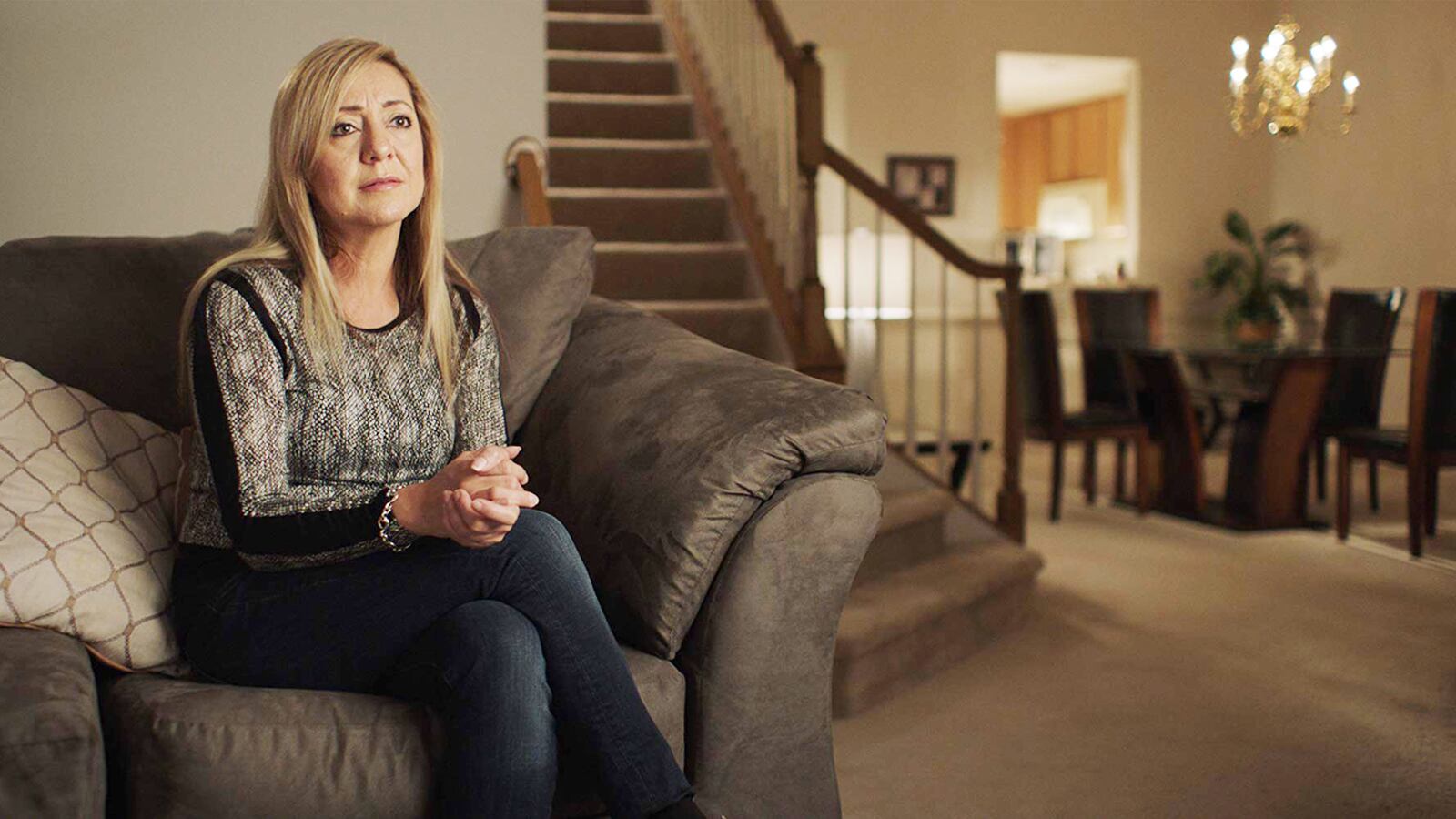Yes, you see John Wayne Bobbitt’s severed genitals in Lorena, Amazon’s new four-part documentary premiering Friday, Feb. 15. Yet the most horrifying sight in Joshua Rofé’s series isn’t Bobbitt’s famed injury but, instead, the prolonged courtroom testimony of Lorena Bobbitt, the wife who performed the cut heard ‘round the world—and who, on the stand, gave courageous voice to the scourge of domestic violence that she, like millions of other women, was forced to suffer at the hands of her partner.
Executive produced by Jordan Peele, Lorena has aspirations similar to those of Ezra Edelman’s masterful O.J.: Made in America. Rofé’s non-fiction show is a micro account that aims to recontextualize the sleazy 1993 tabloid story into a case study of domestic abuse gone horribly awry, and Lorena as the embodiment of battered-woman syndrome. As envisioned by the director, Lorena’s saga was about a woman driven to commit an act of extreme violence out of PTSD-related rage and anguish, as well as an American society that wasn’t prepared to process how she—rather than her disfigured husband—could be the real victim in this national spectacle. It’s a perspective that strives to see beyond the cheap headlines, and proves not only compelling, but downright inarguable, thanks to Lorena’s own tearful recollections in front of a judge and jury.
Originally broadcast live on Court TV—helping further stoke its tawdry appeal—Lorena’s testimony, replayed in unbroken clips in Lorena, reveals a woman with terror in her eyes, and in her chest, such that she can barely get the words out of her mouth, her tearful statements given through hyperventilating gasps for air. It’s the sight of a woman struggling, with palpable agony, to personally revisit, and publicly recount, instances of anal rape, coerced abortion, and physical and psychological assault that lasted for years courtesy of former Marine John. The question of “credibility” was crucial during Lorena’s trial for “malicious wounding,” which followed John’s earlier acquittal on charges of “marital sexual assault.” Nonetheless, any he-said, she-said dynamic is erased by this footage, which conclusively presents Lorena, shaken to her core by her admissions of torture and manipulation, as the trustworthy of the two.
As Lorena elucidates, the issue of Lorena’s guilt actually hinged on the defense’s contention that, per a Virginia statute, she had carried out de-cock-itation while in the throes of an “irresistible impulse” (i.e., temporary insanity, in which she knew she was doing something wrong but couldn’t stop herself). In other words, the legal battle had to do with a fine technicality rather than the larger truth that was plain for all to see—namely, that John had so tormented his Ecuador-born wife that, after yet another instance of the “forcible sex” he so loved, she snapped, and sought justifiable revenge for years of abuse via a 7-inch kitchen knife. Even the prosecution didn’t dispute those facts; they merely insisted that her behavior didn’t fit the state’s “irresistible impulse” definition. And as Rofé reveals, district attorney Paul Ebert actively helped the defense’s cause by leading a key witness to their doorstep, and then refusing to cross-examine her—a stunning twist that’s confirmed by Ebert himself, who merely flashes a sly smile when confronted with this tidbit during a new interview.
Rofé fleshes out his account with plentiful on-camera chats with both Lorena and John, the former still seemingly taken aback by her ordeal, and the latter as defiant as ever. John spends a lot of time asserting that he was a loving spouse to Lorena, and that he was never violent with any woman—this despite not only Lorena’s claims, but similar charges filed against him by a litany of subsequent wives and girlfriends, including an escort from the Bunny Ranch (where he worked as a greeter) who says that he hung her over the railing of their apartment and then raped her for three straight days. In total, it’s a damning portrait of John, who comes off as a dim bulb with no ambition or job skills, and a habit of transforming from a mild-mannered guy to a fearsome monster after a few drinks. In light of this unflattering depiction, it’s easy to understand why his post-trial life mainly consisted of gonzo movies, jail sentences, and other assorted scandals.
He’s not, however, Lorena’s only villain. Also in Rofé’s crosshairs are a just-blossoming 24-hour cable news cycle that sought to compete with tabloid programs like Inside Edition and talk shows such as Jenny Jones, not to mention Howard Stern—who repeatedly, disgustingly defended John, including via a typically juvenile telethon, as well as comments about how John couldn’t have raped Lorena because she was too pimply and unattractive. These ratings-seekers reduced Lorena to a psycho who hated men, and most coverage focused on the incident’s most sensationalistic component—his penis, which was tossed in the bushes by Lorena, and then discovered and reattached—at the expense of the domestic abuse that had fueled the entire affair, and which was emblematic of a plague with which women were all too familiar.
Hence, while males viewed the story as the realization of their worst nightmares, females naturally assumed that John must have done something heinous to deserve his punishment. Lorena illustrates that, in the aftermath of Lorena’s not-guilty verdict (which followed the 1991 Anita Hill-Clarence Thomas hearings), the Clinton administration successfully passed 1994’s Violence Against Women Act, thus finally shining a glaring spotlight (and providing considerable funds toward combatting) domestic abuse. That legislation underscores the key role Lorena played in bringing attention to the cause. Rofé’s series, alas, isn’t nearly as pioneering, employing stock documentary techniques that often make the proceedings feel mechanical, and overly melodramatic (I’m looking at you, dramatic recreations). From a formal standpoint, it gets the job done, but frequently in a pedestrian manner.
That might be a buzzkill if not for the clarity of Rofé’s sociocultural survey, which captures the larger forces swirling around the Bobbitt circus, and the short- and long-term ramifications the case had on the country. Moreover, the director’s canny decision to run Lorena’s testimony for unbroken minutes on end is a crucial—and defining—one, allowing his argument to stand on the sobbing, heaving shoulders of the person whose unforgettable amputation helped shape the national discourse about sexual (and spousal) assault. His series says everything, ultimately, by letting Lorena speak for herself.







